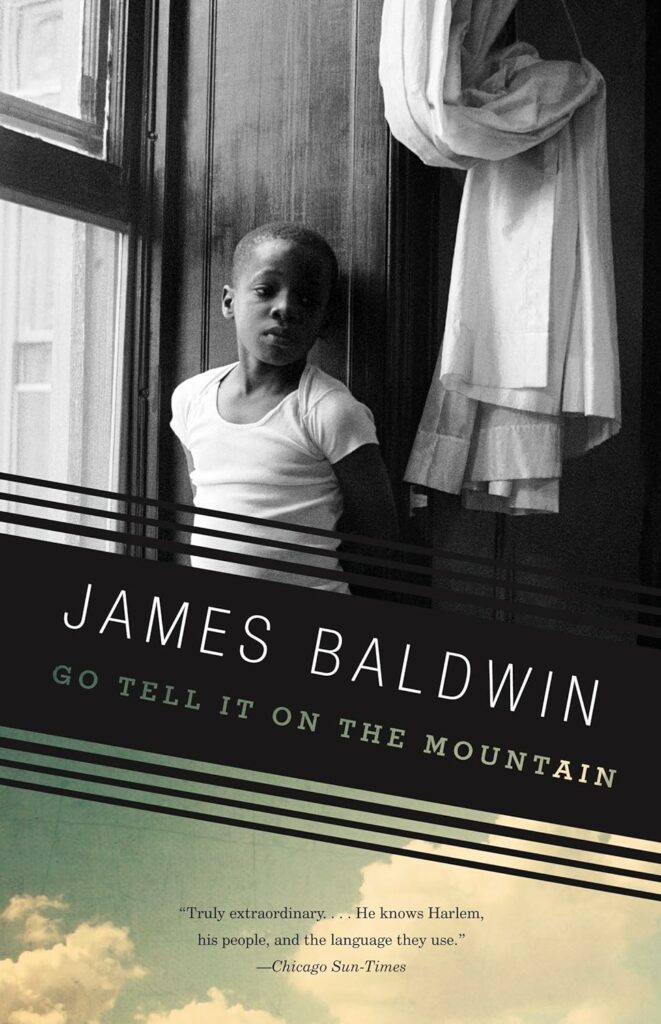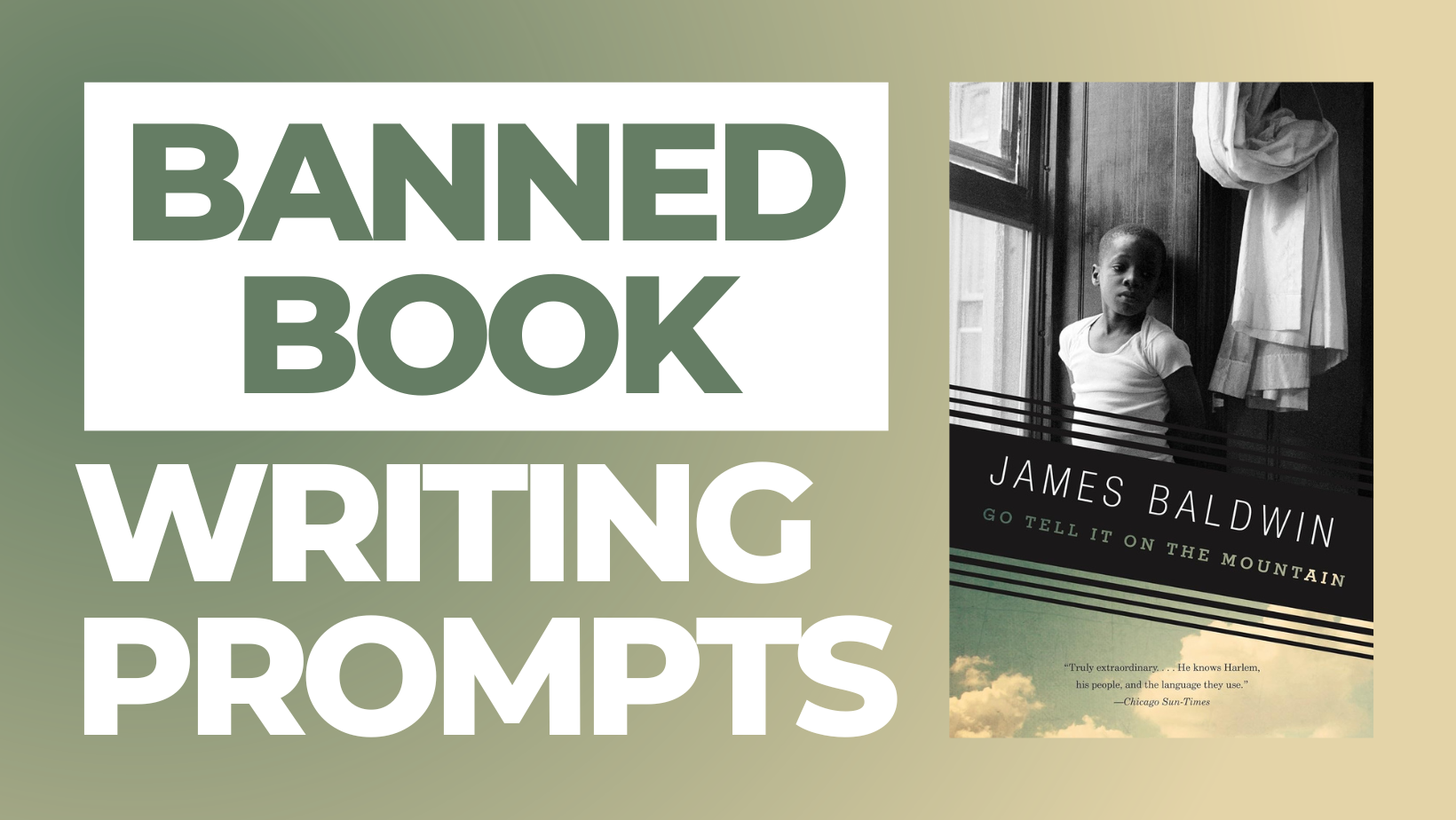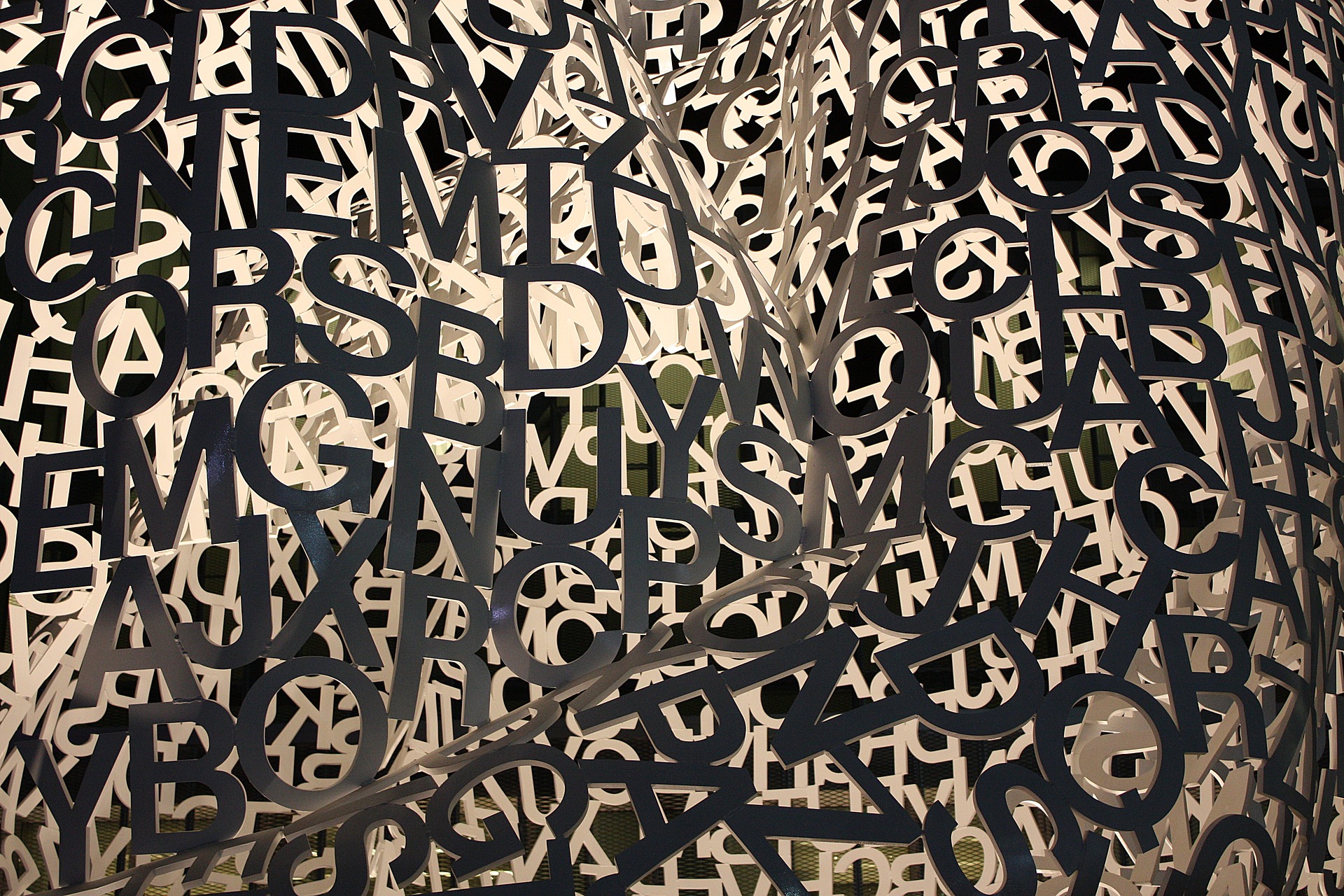In Banned Book Writing Prompts, a new series in Teachers & Writers Magazine, we aim to push back against the growing movement to censor what students can read and to show what happens when we enthusiastically embrace banned works rather than fear them. You can read an introduction to this series by Susan Karwoska here, and you can find more Banned Book Writing Prompts here.
“It’s a long way,” John said slowly, “ain’t it? It’s a hard way. It’s uphill all the way.”
―James Baldwin, Go Tell It on the Mountain
I first read Go Tell It on the Mountain when I was in high school in suburban Des Moines, Iowa—a world that couldn’t be further from Harlem. It is a thing to admire: James Baldwin’s ability to take me so far from my late-80s Midwestern bubble, straight into the heart of John Grimes, a 14-year-old Black boy who’s harboring a thing for Brother Elisha in their Evangelical Baptist church and whose fear of his father, Gabriel, is tearing at his soul as much as his resentment against the expectation that he become a preacher.
Readers know that Gabriel is not John’s true father, just as they know that his biological father killed himself following an unfounded accusation that he’d robbed a white man. For that matter, John’s father didn’t know about John, either, before he died. These secrets shape John more than he knows; while he understands the demon within him to be his love for Elisha, we understand that the true demon at the center of Go Tell It on the Mountain is white supremacy itself, an evil that has brought misery and bitterness upon John and the generations before him. Inheritors of the ravages of chattel slavery, the characters in Go Tell It on the Mountain attempt to seek salvation from a Lord who has yet to redeem them from racial injustice.
Baldwin’s oratorical style was a salve and a seduction, pulling me into one such world and compelling me to feel deeply about the people who inhabited it, to wonder about their lives, and to engage critically with the questions the book raised.
I have to wonder now: How much of this did I understand from my white perch upon a hill in suburban Iowa? I was no more like John Grimes than I was the redeemer Himself, and yet I felt a kinship with John in his desire for a self he could call his own. I loved that about reading. Surrounded by thousands of miles of corn, I read to connect with other worlds that were nothing like my own. Baldwin’s oratorical style was a salve and a seduction, pulling me into one such world and compelling me to feel deeply about the people who inhabited it, to wonder about their lives, and to engage critically with the questions the book raised.
This is why I was so sad and angry to learn that in May of this year, Iowa’s governor signed a bill into law that removes a civics exam requirement for high school students and bans discussions of sexual orientation and gender identity in K-12 schools. It also bans from school libraries any book that depicts sexual acts. Go Tell It on the Mountain falls into this category, even though John’s love for Elisha is so vague and unrealized and the sex scene between Gabriel and his mistress, Ester, is so brief that it’s hard to imagine anyone focusing on these as grounds for removing the book. It seems to me that what Iowa’s Republican legislators are truly banning in this case is John’s religious doubt and the book’s wholly convincing argument that white supremacy seeks to destroy Black life.

Writing Prompt 1
Read the following excerpts from Go Tell It on the Mountain:
What, he wondered, did she say to Aunt Florence when they talked together? Or to his father? What were her thoughts? Her face would never tell. And yet, looking down at him in a moment that was like a secret, passing sign, her face did tell him. Her thoughts were bitter.
(pp. 26-27)
Yet, in Florence’s heart tonight hatred and bitterness weighed like granite, pride refused to abdicate from the throne it had held so long.
(p. 74)
His power was greater because he belonged to God. Now, John felt no hatred, nothing, only a bitter, unbelieving despair: all prophecies were true, salvation was finished, damnation was real!
(p. 226)
Where joy was, there strength followed; where strength was, sorrow came—for ever? For ever and for ever, said the arm of Elisha, heavy on his shoulder. And John tried to see through the morning wall, to stare past the bitter houses, to tear the thousand grey veils of the sky away, and look into that heart—the monstrous heart which beat for ever, turning the astounded universe, commanding the stars to flee away before the sun’s red sandal, bidding the moon to wax and wane, and disappear, and come again; with a silver net holding back the sea, and, out of mysteries abysmal, re-creating, each day, the earth. That heart, that breath, without which was not anything made which was made. Tears came into his eyes again, making the avenue shiver, causing the houses to shake—
(p. 251)
Bitter: having a sharp, pungent taste; angry, hurt, or resentful because of one’s bad experiences or a sense of unjust treatment (Oxford Languages).
Baldwin uses the word “bitter” 14 times throughout the novel to describe the feelings and experiences of his characters who are suffering under the weight of intergenerational trauma; he uses “bitterness” 12 times. People feel bitter in Baldwin’s novel; they are bitter; despair is bitter and even houses, too.
Generate a list of adjectives and/or nouns to describe yourself, your family, or your community. Pick one of these words and experiment with using it a number of times, in a plethora of ways, within a single page of writing. This can be prose or poetry. Let your use of the word surprise you as you use it to describe a lived experience which may not otherwise be felt or understood.
Writing Prompt 2
But when he reached the summit he paused; he stood on the crest of the hill, hands clasped beneath his chin, looking down. Then he, John, felt like a giant who might crumble this city with his anger; he felt like a tyrant who might crush this city beneath his heel; he felt like a long-awaited conqueror at whose feet flowers would be strewn, and before whom multitudes cried, Hosanna! He would be, of all, the mightiest, the most beloved; the Lord’s anointed; and he would live in this shining city which his ancestors had seen with longing from far away. For it was his; the inhabitants of the city had told him it was his; he had but to run down, crying, and they would take him to their hearts and show him wonders his eyes had never seen.
And still, on the summit of that hill he paused. He remembered the people he had seen in that city, whose eyes held no love for him. And he thought of their feet so swift and brutal, and the dark grey clothes they wore, and how when they passed they did not see him, or, if they saw him, they smirked. And how their lights, unceasing, crashed on and off above him, and how he was a stranger there. Then he remembered his father and his mother, and all the arms stretched out to hold him back, to save him from this city where, they said, his soul would find perdition.
And certainly perdition sucked at the feet of the people who walked there; and cried in the lights, in the gigantic towers; the marks of Satan could be found in the faces of the people who waited at the doors of movie houses; his words were printed on the great movie posters that invited people to sin. . . . (p. 38)
In this excerpt, we see Baldwin break the “rule” that many young writers learn: never start a sentence with “but” or “and.” Throughout the novel, Baldwin uses an oratorical style that lulls and seduces; it pulls readers in, then hits them with a truth, often by starting sentences with “but” or “and.”
Write a scene or a poem in which you start every sentence with “but” or “and.” Where does it lead you? What voices or arguments emerge?
Sarah Dohrmann is a Brooklyn-based writer of literary nonfiction whose work has appeared in Harper’s Magazine, Tin House Magazine, The Iowa Review, and New York, among others. She began teaching in the schools with T&W in 2001 and currently teaches at New York University; she also independently leads a personal nonfiction writing workshop called Diving Into the Wreck. After earning her MSW in June 2023, Sarah serves as a clinical social worker in the Domestic Violence Aftercare Program at University Settlement in New York City's Lower East Side.




